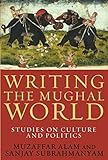Writing the Mughal World : Studies on Culture and Politics / Sanjay Subrahmanyam, Muzaffar Alam.
Material type: TextPublisher: New York, NY : Columbia University Press, [2011]Copyright date: ©2011Description: 1 online resource (536 p.)Content type:
TextPublisher: New York, NY : Columbia University Press, [2011]Copyright date: ©2011Description: 1 online resource (536 p.)Content type: - 9780231158114
- 9780231527903
- 954.025 23
- DS461 .A43 2012
- DS461
- online - DeGruyter
- Issued also in print.
| Item type | Current library | Call number | URL | Status | Notes | Barcode | |
|---|---|---|---|---|---|---|---|
 eBook
eBook
|
Biblioteca "Angelicum" Pont. Univ. S.Tommaso d'Aquino Nuvola online | online - DeGruyter (Browse shelf(Opens below)) | Online access | Not for loan (Accesso limitato) | Accesso per gli utenti autorizzati / Access for authorized users | (dgr)9780231527903 |
Frontmatter -- Contents -- Preface -- Acknowledgements -- Abbreviations -- Introduction: The Old and the New in Mughal Historiography -- 1. Letters from a Sinking Sultan -- 2. The Mughals Look Beyond the Winds -- 3. On the End of the Akbari Dispensation -- 4. The Deccan Frontier and Mughal Expansion, Circa 1600 -- 5. Faizi's Nal-Daman and Its Long Afterlife -- 6. Catholics and Muslims in the Court of Jahangir 249 (1608-1611) -- 7. The Making of a Munshī -- 8 .Trade and Politics in the Arcot Nizamat (1700-1732) -- 9. Eighteenth-Century Historiography and the World of the Mughal Munshī -- 10. The Political Thought of a Late-Eighteenth-Century Mughal Prince -- Epilogue: Mughals in Exile -- Index
restricted access online access with authorization star
http://purl.org/coar/access_right/c_16ec
Between the mid-sixteenth and early nineteenth century, the Mughal Empire was an Indo-Islamic dynasty that ruled as far as Bengal in the east and Kabul in the west, as high as Kashmir in the north and the Kaveri basin in the south. The Mughals constructed a sophisticated, complex system of government that facilitated an era of profound artistic and architectural achievement. They promoted the place of Persian culture in Indian society and set the groundwork for South Asia's future development.In this volume, two leading historians of early modern South Asia present nine major joint essays on the Mughal Empire, framed by an essential introductory reflection. Making creative use of materials written in Persian, Indian vernacular languages, and a variety of European languages, their chapters accomplish the most significant innovations in Mughal historiography in decades, intertwining political, cultural, and commercial themes while exploring diplomacy, state-formation, history-writing, religious debate, and political thought. Muzaffar Alam and Sanjay Subrahmanyam center on confrontations between different source materials that they then reconcile, enabling readers to participate in both the debate and resolution of competing claims. Their introduction discusses the comparative and historiographical approach of their work and its place within the literature on Mughal rule. Interdisciplinary and cutting-edge, this volume richly expands research on the Mughal state, early modern South Asia, and the comparative history of the Mughal, Ottoman, Safavid, and other early modern empires.
Issued also in print.
Mode of access: Internet via World Wide Web.
In English.
Description based on online resource; title from PDF title page (publisher's Web site, viewed 02. Mrz 2022)


